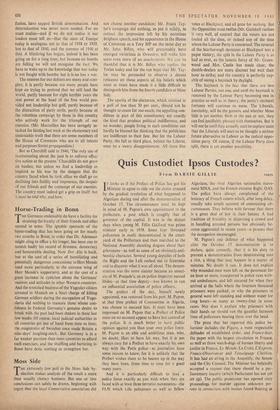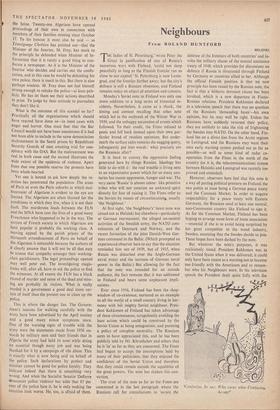Quis Custodiet Ipsos Custodes?
From DARSIE GILLIE
PARIS
IT looks as if the Prefect of Police has got his Minister to agree to ride out the storm aroused by the gradual revelation of what happened to Algerians during and after the demonstration of October 17. The circumstances must be kept in mind of M. Papon's own appointment to the prefecture, a post which is roughly that of governor of the capital. It was in the distant days when young M. Felix Gaillard was prime minister early in 1958. Some four thousand policemen in mufti demonstrated in the court- yard of the Prefecture and then marched to the National Assembly shouting slogans about their grievances—as well as some of an obviously anti- Semitic character. Several young deputies of both the Right and the Left rushed out to fraternise and to discover what it was all about. The demon- stration was the more sinister because an associ- ate of M. Poujade's, an ex-police inspector named Dides—at that time deputy—was known to run an influential association of police officers.
The prefect of the day, himself newly appointed, was removed from his post. M. Papon, at that time prefect of Constantine in Algeria, was chosen to succeed him. It must have been impressed on M. Papon that a Prefect of Police must on no account appear to have lost control of the police. It is much better to have public opinion against you than your own police force. M. Papon is an able and ambitious man, who, no doubt, likes to have his way, but it is not always easy for a Prefect to have exactly his own way with the Paris police—as journalists have some reason to know, for it is unlikely that the Prefect wishes them to be beaten up in the way they have been, from time to time for a good many years.
And it is particularly difficult to lead a police force exactly as you wish when they are faced with at least three terrorist movements—the FLN which kills policemen as well as fellow Algerians, the rival Algerian nationalist move- ment MNA, and the French extreme Right, OAS. The police have always complained of the leniency of French courts which, after long delay, usually take ample account of extenuating cir- cumstances. They believe with fervour that there is a great deal of law in their batons. A bad tradition of brutality in dispersing a crowd and in handling arrested persons has obviously be- come aggravated in recent years—a process that the occupation encouraged.
M. Papon's one defence of what happened after the October 17 demonstration is to declare, quite correctly, that it is his duty to prevent a demonstration from deteriorating into a riot, a thing that may happen in a matte' of minutes. No doubt it can. It does not explain why wounded men were left on the pavement for an hour or more, transported in police vans with- out ambulances, and left uncared for when they arrived at the halls where the fourteen thousand prisoners were parked; or why the prisoners in general were left standing and without water for long hours—as many as twenty-four in some cases. Nor does it explain why prisoners with their hands up should run the gauntlet between lines of policemen beating them over the head.
The press that has reported this police be- haviour includes the Figaro, a most respectable defender of established order, and France-Soir, the paper with the largest circulation in France, as well as those watch-dogs of human liberty and justice in France, Le Monde, La Croix, L'Express, France-Obserrateur and Temoignage Chretien. It has had an airing in the Assembly, the Senate and the City Council. The Minister has belatedly accepted a request that there should be a par- liamentary inquiry (which Parliament has not yet set up). The public prosecutor has opened sixty proceedings for murder against unknown per- sons in connection with bodies found floating in .the Seine. Twenty-one Algerians have opened proceedings of their own in connection with members of their families missing since October 17. To his honour it must also be said — as Temoignage Chretien has pointed out—that the Minister of the Interior, M. Frey, has stuck to the principle he defended when Minister of In- formation that it is rarely a good thing to con- fiscate a newspaper. As it is the Minister of the Interior who decides and carries out the confis- cation, and in this case he would be defending his own police, there is merit in this. But there is also perhaps wisdom. M. Frey does not feel himself strong enough to rebuke the police—at least pub- licly. He has let them see their actions described in print. To judge by their attitude to journalists they don't like it.
What is the outcome of this scandal so far? Practically all the organisations which should have reacted have done so—in most cases with anger and horror. One must fear that the Bar Council would not have been unanimous if it had not been able to include in the same denunciation maltreatment in the Sante prison by Republican Security Guards of men awaiting trial for con- spiracy with the OAS. But the maltreatment was real in both cases and the second illustrates the wide extent of the epidemic of violence. Apart from that one possible reserve the protests have been whole-hearted.
Yet one is bound to ask how deeply the re- action has penetrated the population. ,The areas of Paris or even the Paris suburbs in which mal- treatment of Algerians is evident to the eye are limited. The Algerians are often blamed for the conditions in which they live, when it is not their fault. The murderous feuds between the FLN and the MNA have cost the lives of a good many Frenchmen who happened to be in the way. The section of French society in which Algerians are least popular is probably the working class. A moving appeal by the parish priests of the thirteenth arrondissement of Paris on behalf of the Algerians is noticeable because the authors of it clearly assume that it will not be all that easy to arouse that sympathy amongst their working- class parishioners. The legal proceedings opened may well peter out. The investigating magis- trates will, after all, have to ask the police to find the witnesses. At all events the FLN has a black record of murder and some of the dead and miss- ing are probably its victims. What is really needed is a government a good deal more cer- tain of itself than the present one to clean up the police.
This is where the danger lies. The Govern- ment's reasons for walking carefully with the army have been advertised by the April mutiny and a good many minor symptoms since.
• One of the warning signs of trouble with the army were the statements made from 1956 on- wards by military men and their friends that in Algeria the army had held its nose while doing an essential though nasty job and was being thanked for it by a campaign of vile abuse. This is exactly what is now being said on behalf of the police. Such declarations by prefect and minister cannot be good for police loyalty. They indicate indeed that there is something very wrong. And when the Socialist Senator Defferre denounces police violence but adds that 85 per cent of the police hate it, he is only making the situation look worse. He, too, is afraid of them.











































 Previous page
Previous page